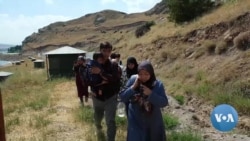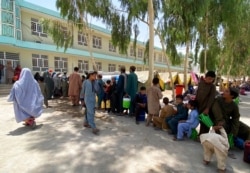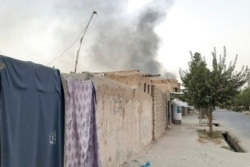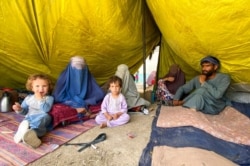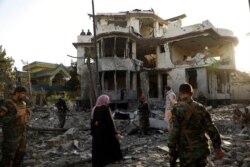In recent months, thousands of Afghan civilians have been fleeing their country amid surging violence between the Afghan government and the Taliban as the United States works to complete its troop pullout by the end of August.
VOA spoke to some of the Afghans who had used smugglers to help them cross to Iran and then to Turkey en route to Europe. They said they were fed up with the Taliban violence and the inability of the Afghan government to rule effectively.
"We spend the nights out in the mountains and during the days we have to walk under the sun with no food and water," said Sakineh, a middle-aged Afghan woman, while walking along a highway in Turkey's eastern province of Van close to Iran. "Blisters are all over our feet."
She and other Afghans in Turkey requested their full identity not be disclosed to avoid deportation by Turkish officials. They include women and minors — many exhausted and dehydrated from walking for nearly 20 hot summer days.
"We smelled filthy because we had to remain in the deserts for so long. We reached a point when we could find water to wash," said Sakineh, adding her group walked mostly during the midnight hours to avoid being spotted by border guards.
Her wish is to finally relocate to a Western country where she can raise her children without the fear of the Taliban. She said remaining in Afghanistan became unbearable for her after Taliban gunmen destroyed her village and killed her brother.
"They burned down all our houses. They burned everything. They burned our farms and all our products, including our orchards and grain fields," she told VOA.
With intra-Afghan peace talks stalled, the Taliban have increased their attacks against the Afghan military. The U.S. watchdog Special Inspector General for Afghanistan Reconstruction, or SIGAR, last Thursday said the militants have significantly accelerated their violence since the U.S.-Taliban agreement in February 2020, causing the Afghan government to face an "existential crisis."
The agreement cleared the way for the withdrawal of foreign forces after nearly 20 years of war in Afghanistan.
A U.N report last week said that civilian casualties have increased by 47% in the first half of this year, compared to the same period last year. It found that among the 1,659 civilians killed and 3,254 wounded during the first half of 2021, nearly half of them were women and children.
Smuggling route
VOA reporting indicates that many of the Afghans fleeing the latest wave of violence start their days-long journey to get outside Afghanistan from the southwestern province of Nimruz bordering Pakistan and Iran.
Mohammad Tayeb Samadi, a former provincial official, said men between ages 18 to 30 constituted the majority of those crossing the border but children, elderly people and women were also among them.
He said people use smugglers to transport them from the province's capital city, Zaranj, to the Balochistan desert in Pakistan and then into Iran.
"They are from nearly all the provinces. They first come to Zaranj, and then human traffickers take them to Chahar Burjak district, which is located on the border with Iran and Pakistan," Samadi told VOA.
Locals said that has turned the city into a hub for human traffickers who take the people through illegal and often life-threatening routes.
Mehran, a Zaranj shopkeeper, said that some smugglers transfer people at night to avoid drawing attention directly from Zaranj to Iran's Zabol county in Sistan and Balochistan province. Others use illegal routes in Chahar Burjak District in Nimruz to Iran's Zahidan City.
He estimated that about 2,000 people cross Chahar Burjak and 500 people cross Zaranj, every day.
"They go through treacherous routes. Many are killed. There are thieves on the way. They are also killed by the bullets fired by the Iranian security forces," he added.
There are an estimated three million Afghan refugees and asylum-seekers around the world. The International Organization for Migration estimates that the number of Afghans crossing the border illegally has increased by 30-40% since international forces began withdrawing in May.
Afghan officials did not respond to a request for comment from VOA on the rise in refugees.
Zabihullah Farhang, a spokesperson for Afghanistan's Independent Human Rights Commission (AIHRC), said the new influx of migration was due in large part to a growing sense of disappointment among the Afghans that they are losing "their fundamental human rights, such as rights to education, health care, and even life."
Farhang said he was particularly concerned "because manpower is leaving the country which is the driving force behind the development in the country."
Deportation fears in Turkey
Traveling with Sakineh from Iran to Turkey was Riza, along with his wife and toddler son. He said they were lucky to have made it to Van, a city in Turkey's east, where they can feel secure for the moment.
"We walked the whole night without knowing where we were going. We walked through the deserts and the roads. The stray dogs were wandering around us, and the kids got really scared. The dogs chased us and were this much close to grabbing the kids," said Riza, adding he and his family were determined to keep moving forward regardless of the hardships ahead.
"We have no money, but we will keep going and will see what God has destined for us," he said.
Local Turkish officials say that since January, Van has registered more than 34,000 refugees crossing from Iran, with Afghans making up the majority. Local border guards in different operations have reportedly detained 1,456 refugees and 11 smugglers for illegally crossing.
Bahtiyar Kandeger, a member of the Immigration and Refugee Commission of the Van Bar Association, told VOA that refugees are often sent back across the border when caught by Turkish security forces
"This is illegal," said Kandeger. "Once people have crossed the border into Turkey, the police or gendarmerie who caught them must register them in the system after completing the processes such as identifying those people and taking their fingerprints," he said.
Disillusioned youth
The U.N. refugee agency, UNHCR, estimates that more than 100,000 Afghans sought asylum in Turkey alone last year.
Nurullah, a young Afghan with a bachelor's degree who crossed into Turkey this month, said that Afghanistan's younger generation who managed to escape the Taliban violence in villages find themselves disappointed by the government corruption in bigger cities.
He is a part of Afghanistan's "brain drain" where young people choose to leave because of a lack of access to basic services and insecurity.
"There are no job opportunities in Afghanistan. If you want to work with the Afghan government, you either have to pay money to get hired or have a strong connection. So, we came here to find a job," said Nurullah, adding that his decision to leave Afghanistan was "out of desperation."
The Afghan government and the Taliban, he said, have disappointed Afghans by failing to reach a settlement.
"Whoever is right or wrong, they do not compromise. Peace is the biggest quest of the Afghan people. If we could have peace, we would be able to have jobs. When there is no peace, there are killings and no one knows who is targeting people, who dies, and who is the killer."




